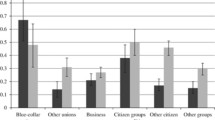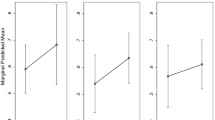Abstract
Organized interest groups tend to focus on a narrow set of issues that promote the common interests of their members. They support political candidates who are favorable toward the group’s interests. But whereas interest groups support politicians based on a narrow set of issues, politicians have platforms that cover the entire political spectrum, so supporting a politician implies supporting all of that politician’s positions. A secondary effect of interest group support for politicians on one issue is that they are also supporting positions on other issues that are well outside the scope of that group’s interests. This analysis shows that the systematic relationships among politicians’ political platforms result in interest groups supporting issues that are well outside the stated common interests of the groups.
Similar content being viewed by others
Notes
Politicians have the incentive to offer vague platforms that find problems with the status quo and pledge to make things better, which everybody supports, rather than offering a specific policy proposal that will be opposed by some voters. This can help win over expressive voters (Brennan and Lomasky 1993) and, by strategically choosing what problems they identify with the status quo, irrational voters (Caplan 2007).
This can also happen with logrolling, as Hillman (2009: 431) shows. In the case of interest group politics, however, there is no political exchange in which people agree to support another group’s issue if the other group supports theirs. Rather, by supporting one interest group, a by-product is that people unintentionally lend support to the goals of other groups.
This paper deals primarily with the American political system, and proportional voting systems tend to support more parties, giving voters more different market baskets to choose from. The analogy still holds: political choice is still among entire market baskets rather than individual items, but it would be worth doing a similar study on interest groups in proportional voting systems. Potters and Sloof (1996), in a survey article from a few decades ago, draw general conclusions about the influence of interest groups in various types of political institutions. Congleton (1991) looks at ideological versus issue-oriented interests in rent-seeking, but organized special interest groups primarily are issue-oriented.
For example, if one interest group gave three candidates ratings of 0, 50, and 100 and another gave those same candidates ratings of 45, 50, and 55, the ratings would be perfectly correlated but the regression coefficients would be far away from 1. Including the coefficients in the tables would make them more difficult to read but would add no meaning to the tables. As a point of information, the mean of the absolute values of all the coefficients in Table 3 is 0.794 with a standard deviation of 0.396, but this information is of little relevance to the relationships among the ratings of the interest groups.
The two-party system in the United States, encouraged by the winner-take-all nature of the electoral system, tends to obscure ideological differences within parties. In European countries that use proportional rather than plurality voting, within-party ideological dispersion of political preferences is more evident, as Bjedov et al. (2014) show.
References
Becker, G. S. (1983). A theory of competition among pressure groups for political influence. Quarterly Journal of Economics, 98, 371–400.
Bjedov, T., Laponte, S., & Madies, T. (2014). The impact of within-party and between-party ideological dispersion on fiscal outcomes: Evidence from Swiss cantonal parliaments. Public Choice, 161(1/2), 209–232.
Brennan, G., & Lomasky, L. (1993). Democracy and decision: The pure theory of electoral preference. Cambridge: Cambridge University Press.
Buchanan, J. M. (1954). Individual choice in voting and the market. Journal of Political Economy, 62(4), 334–343.
Buchanan, J. M., & Tullock, G. (1962). The calculus of consent: Logical foundations of constitutional democracy. Ann Arbor: University of Michigan Press.
Caplan, B. (2007). The myth of the rational voter: Why democracies choose bad policies. Princeton: Princeton University Press.
Congleton, R. D. (1991). Ideological conviction and persuasion in the rent-seeking society. Journal of Public Economics, 44, 65–86.
Congleton, R. D. (2015). The logic of collective action and beyond. Public Choice, 164(3/4), 217–234.
Downs, A. (1957). An economic theory of democracy. New York: Harper & Row.
Hillman, A. L. (2009). Public finance and public policy: Responsibilities and limitations of government (2nd ed.). Cambridge: Cambridge University Press.
Hinich, M. J., & Munger, M. C. (1994). Ideology and the theory of political choice. Ann Arbor: University of Michigan Press.
Olson, M., Jr. (1965). The logic of collective action. Cambridge: Harvard University Press.
Potters, J., & Sloof, R. (1996). Interest groups: A survey of empirical models that try to assess their influence. European Journal of Political Economy, 12(3), 403–442.
Sowell, T. (1980). Knowledge and decisions. New York: Basic Books.
Wittman, D. A. (1989). Why democracies produce efficient results. Journal of Political Economy, 97(6), 1395–1424.
Wittman, D. A. (1995). The myth of democratic failure. Chicago: University of Chicago Press.
Author information
Authors and Affiliations
Corresponding author
Rights and permissions
About this article
Cite this article
Holcombe, R.G., Gmeiner, R.J. Interest group support for non-group issues. Const Polit Econ 29, 303–316 (2018). https://doi.org/10.1007/s10602-017-9244-z
Published:
Issue Date:
DOI: https://doi.org/10.1007/s10602-017-9244-z




